This is the 27th set from a collection of about 350 postcards of the Kaiserliche Marine, or the German Imperial Navy. For the main catalog page of this archive, visit WWI German Navy Postcard Collection.
This set includes:
- Unsere Marine, Seekadettenmesse (Midshipman’s mess)
- Unsere Marine, Tauspleissen (Splicing rope)
- Unsere Marine, Im Schiffslazarett (Ship’s infirmary)
- Unsere Marine, Geschützexerzieren (Artillery drill)
- Unsere Marine, Gewehrreinigen an Bord (Rifle cleaning on board)
- Unsere Marine, Beim Segelaufrollen (Furling sails)
- Unsere Marine, Der Barbier an Bord (The barber on board)
- Unsere Marine, S. Majestät der Kaiser an Bord (His Majesty the Emperor on board)
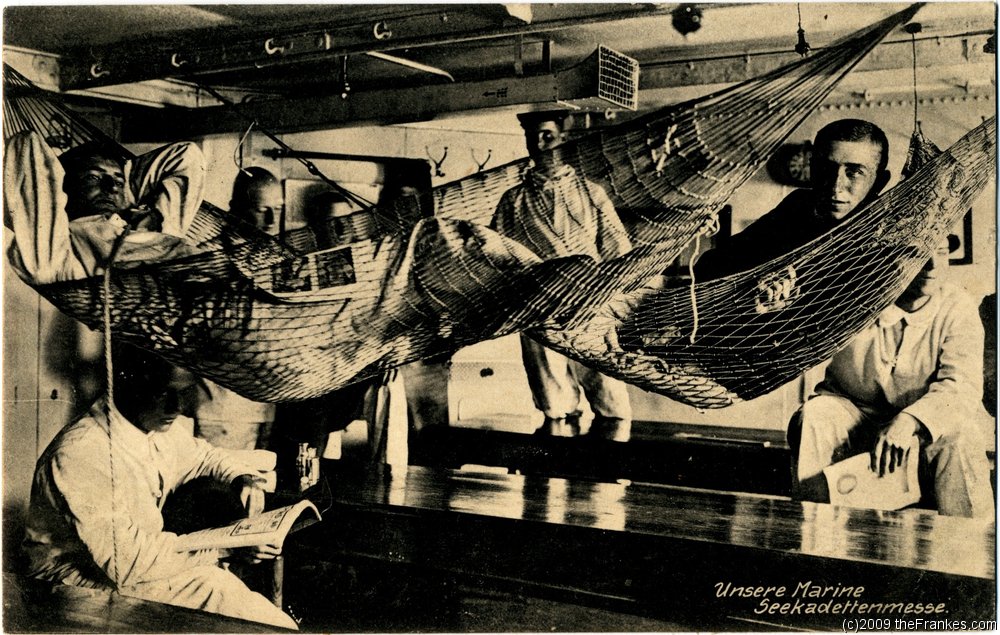
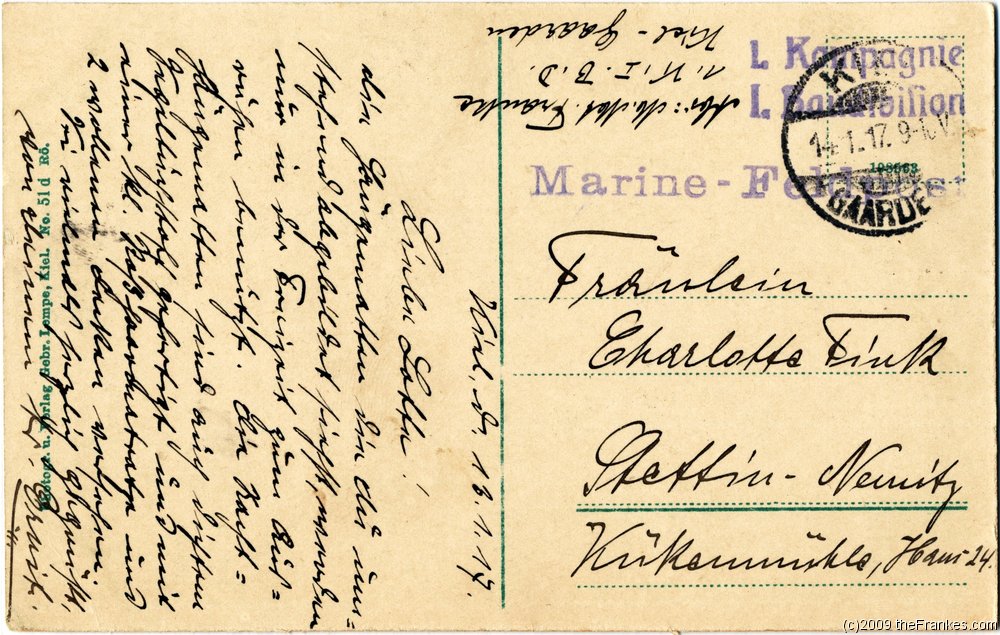
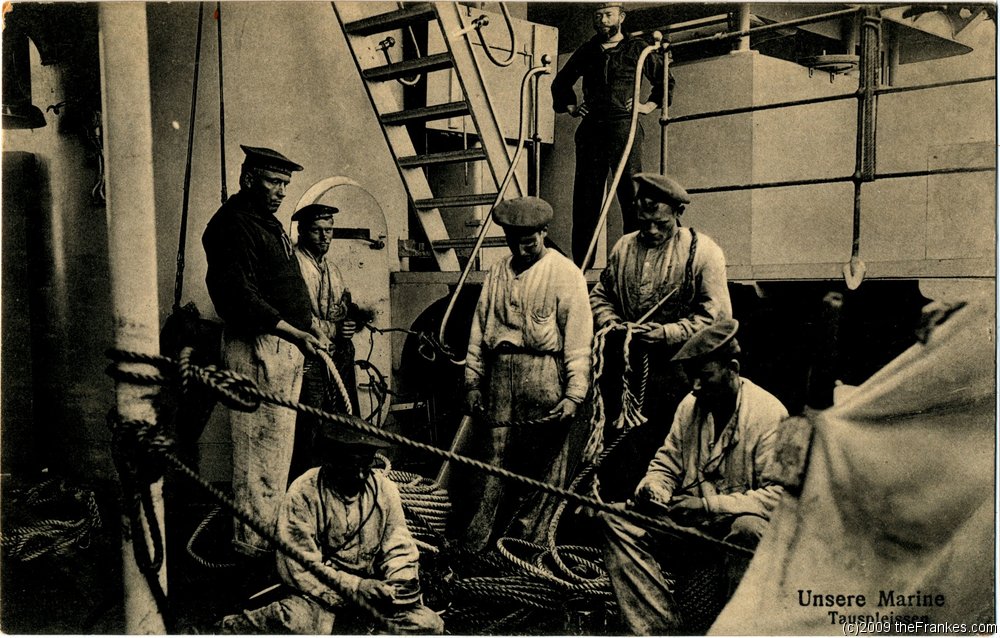
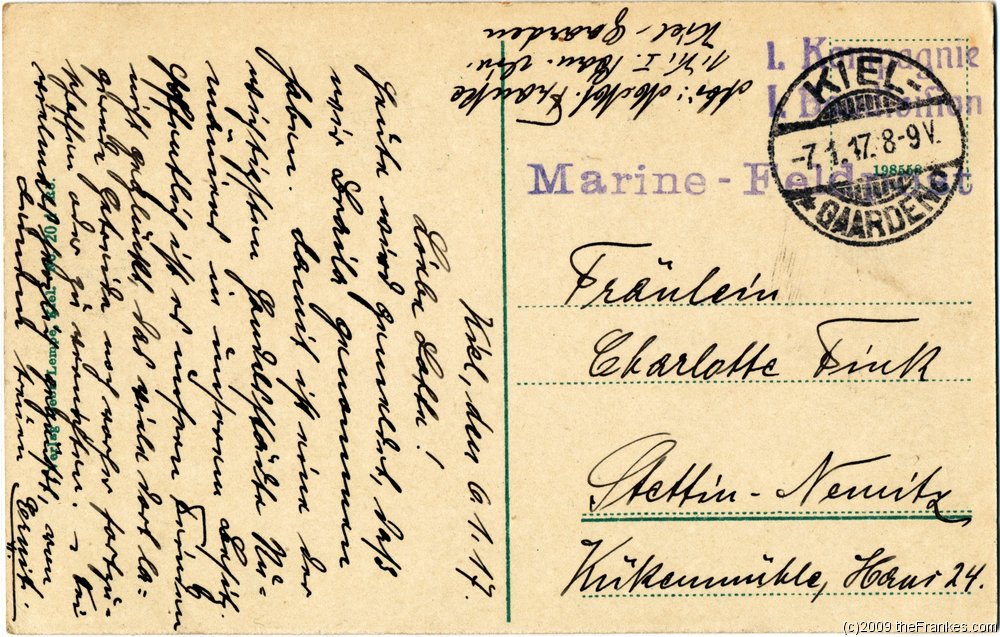
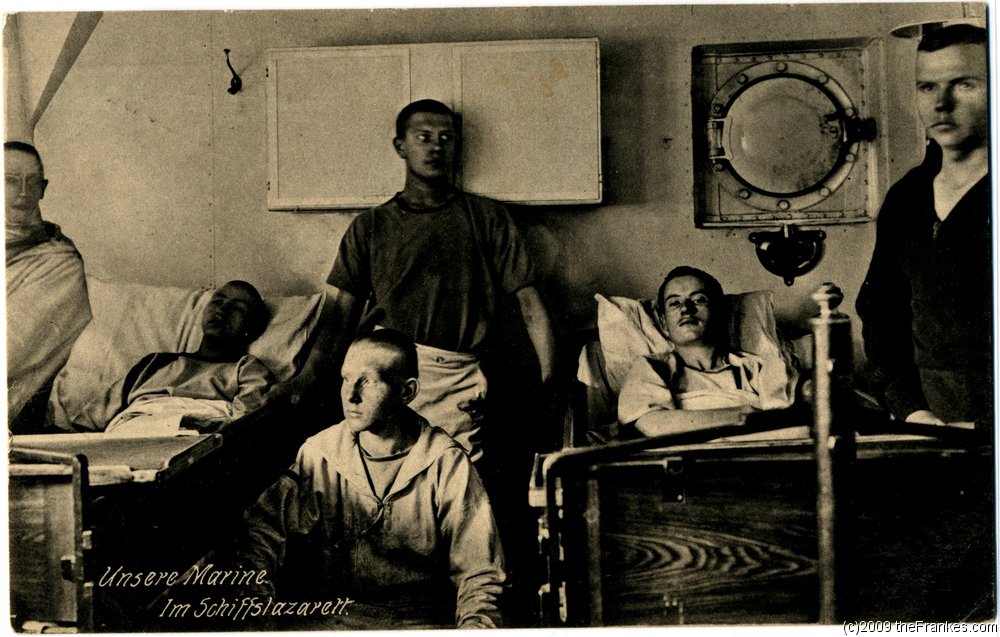
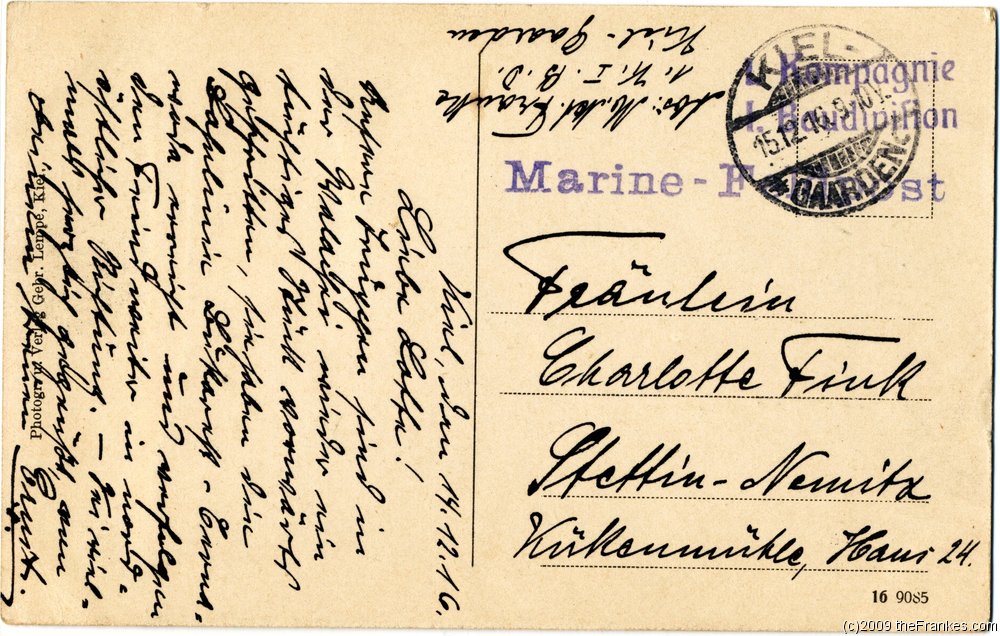
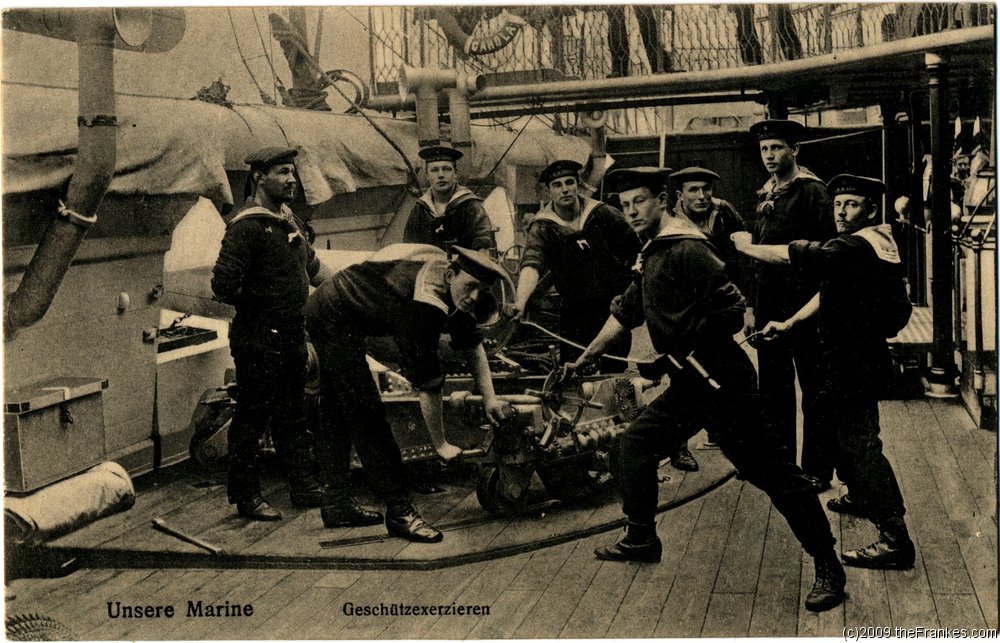
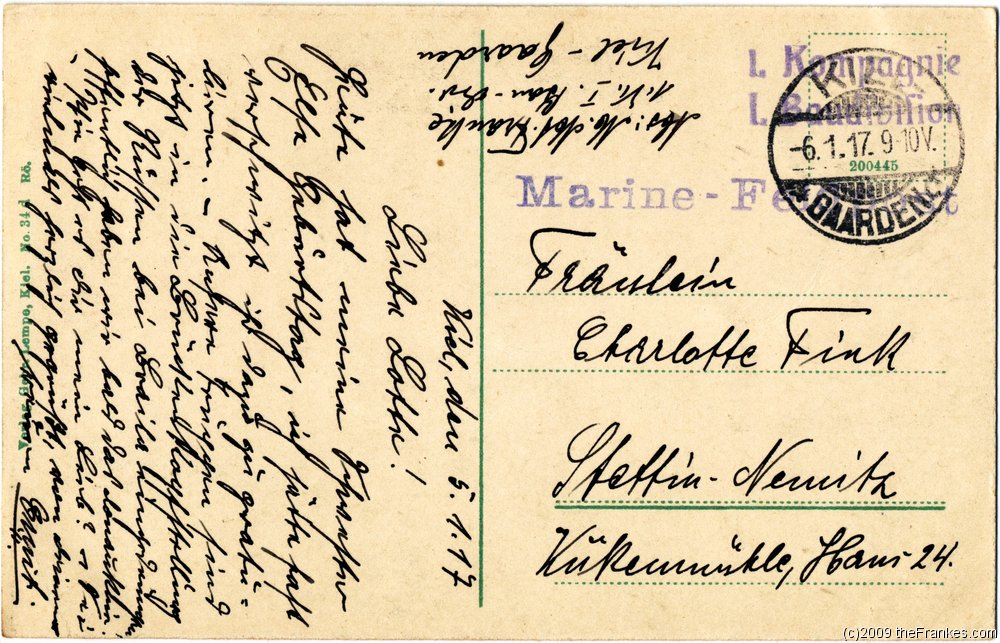
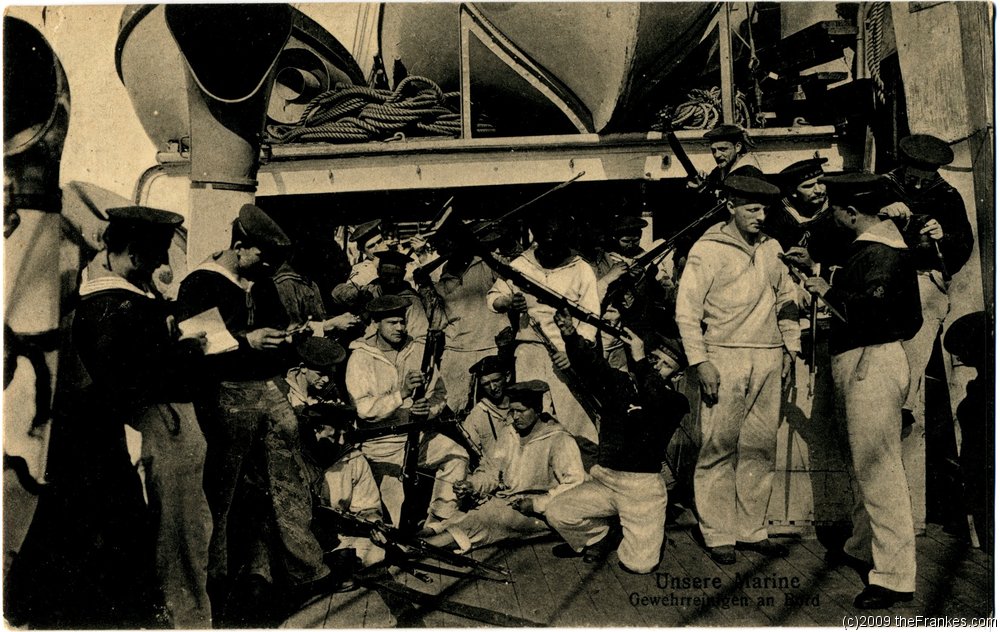
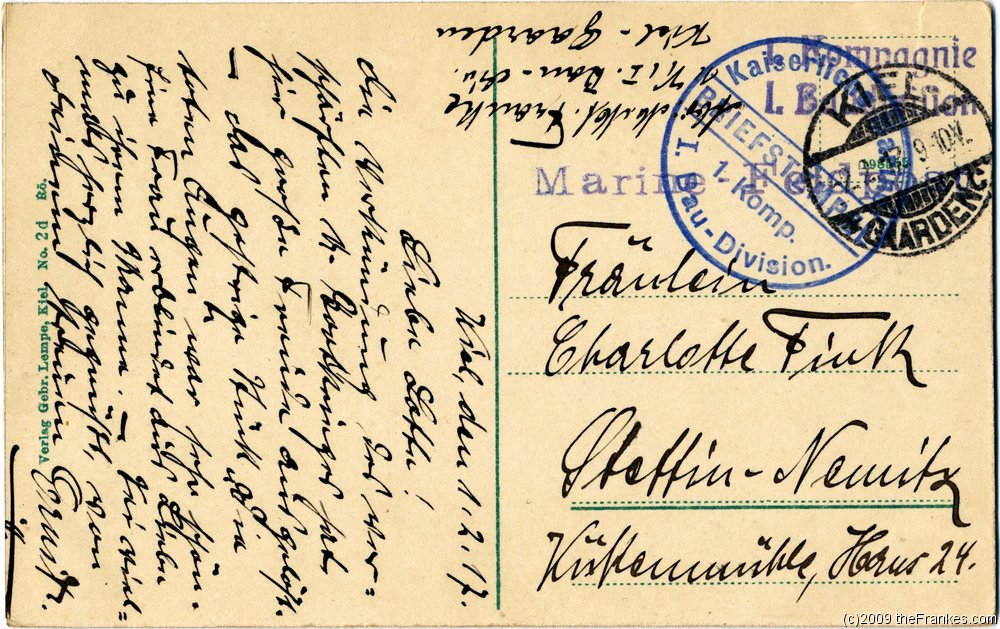
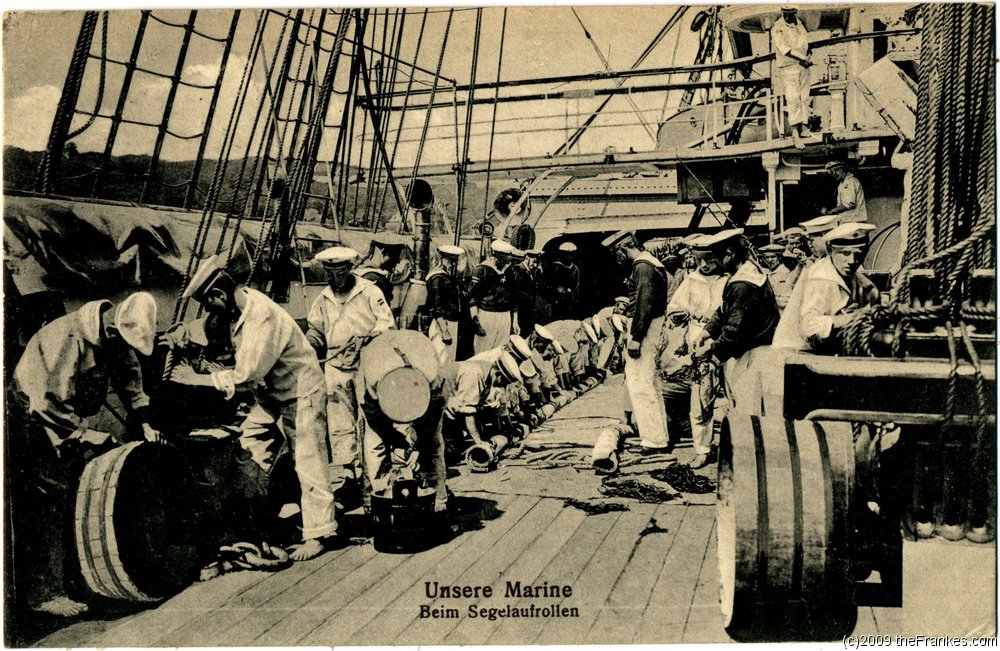
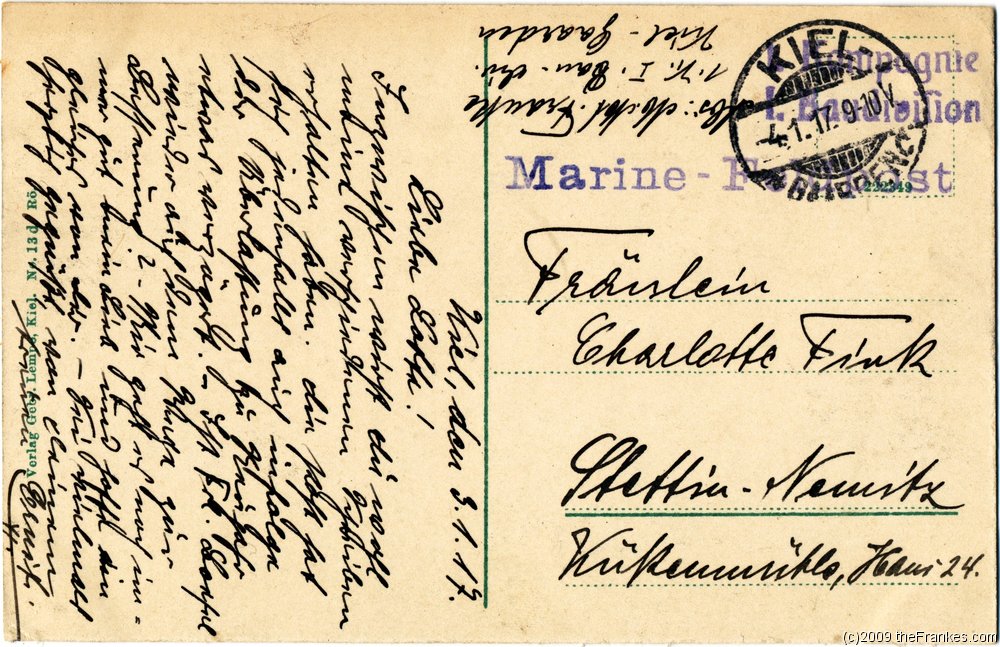
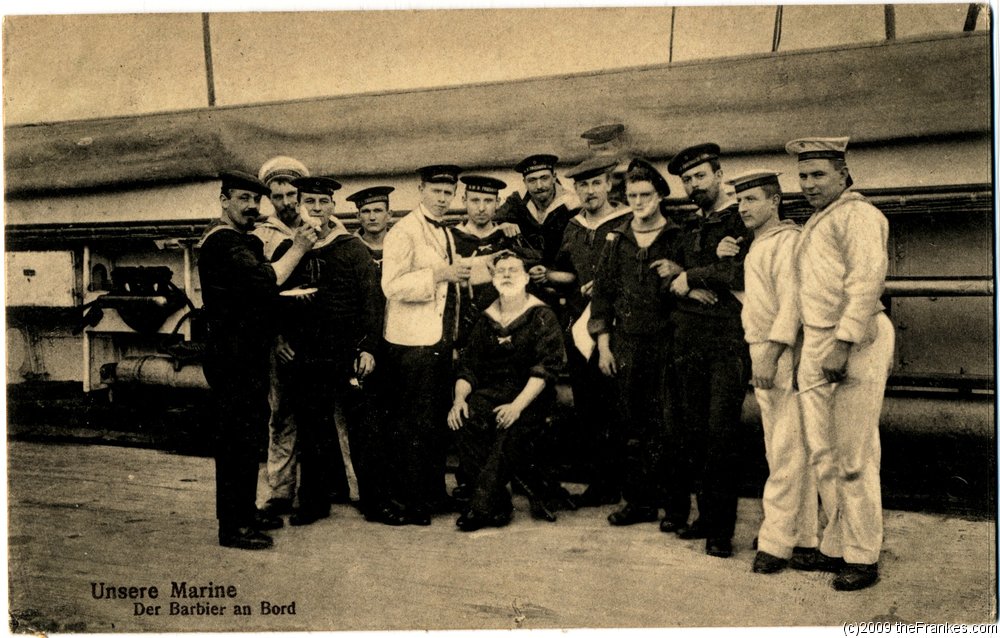
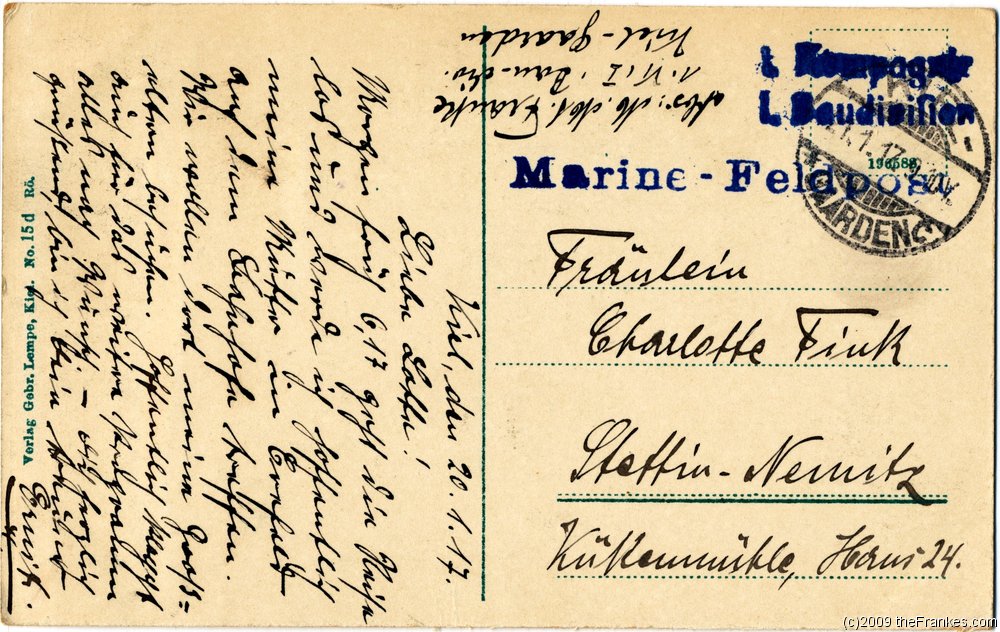
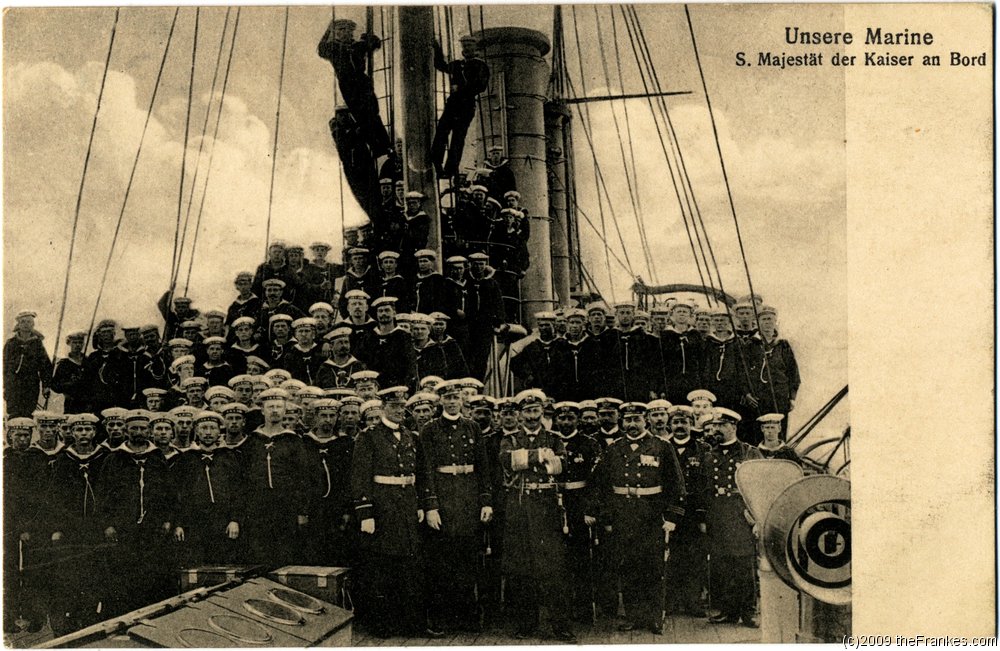
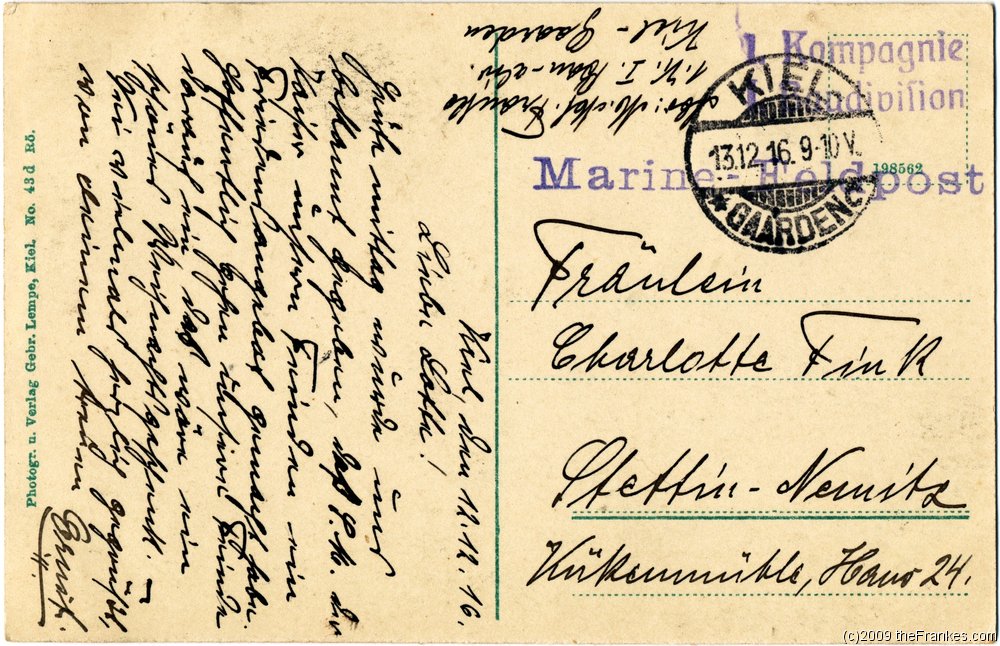

SET 27
1. Liebe Lotte! Kiel, d. 13.1.17
Die Hängematten die Du umstehend abgebildet siehst werden nur in der Freizeit zum Ausruhen benutzt. Die Nachthängematten sind auf dichtem Segeltuch gefertigt und mit einer kl(einen) Rosshaarmatratze und 2 wollenen decken versehen. Sei vielmals herzlich gegrüßt von Deinem tr(euen) Ernst
Dear Lotte! Kiel, 13.01.17
The hammock you see on the picture are used for rest in the spare time only. The hammocks for sleeping are made from thick fabric for sails and are equipped with a small matt made from horse – hairs and two covers woollen blanquets. Many affectionate greetings from your truthful Ernst.
2. Liebe Lotte! Kiel, d. 6.1.17
Heute wird gemeldet, dass wir Braila genommen haben. Damit eine der wichtigsten Handelsstädte Rumäniens in unserem Besitz. Hoffentlich ist es unseren Feinden nicht geglückt, das viele dort lagernde Getreide noch vorher fortzuschaffen oder zu vernichten. Sei vielmals herzlich gegrüßt von Deinem treuen Ernst
Dear Lotte! Kiel, 06.01.17
Today there are reports that we have taken Braila. Now one of the most important trade – cities of Rumania is in our possession. I hope our enemies did not succeed in removing the corn stored there or destrying it. Many affectionate greetings from your truthful Ernst.
3. Liebe Lotte! Kiel, d. 14.12.16
Unsere Truppen sind in der Walachai wieder ein tüchtiges Stück vorwärts geschritten, sie haben die Bahnlinie Bukarest – Cernanovia(?) erreicht und verfolgen den Feind weiter in nordöstlicher Richtung. – Sei vielmals herzlich gegrüßt von Deinem treuen Ernst
Dear Lotte! Kiel, 14.12.16
Our troops have advanced forcefully in Walachia, they reached the railroad from Bucarest to Cernanovia and are pursuing the enemy to the north-east. – Many affectionate greetings from your truthful Ernst.
4. Liebe Lotte! Kiel, d. 5.1.17
Heute hat meine Schwester Amalie Geburtstag, ich hätte fast verschwitzt ihr dazu zu gratulieren. Unsere Truppen sind jetzt in die Brückenkopfstellung der Russen bei Braila eingedrungen, hoffentlich haben wir bald das Donau(…illegible) – Wie geht es Dir mein Lieb? Sei vielmals herzlich gegrüßt von Deinem treuen Ernst
Dear Lotte! Kiel, 05.01.17
Today it’s my sister Amalie’s birthday, I almost missed to congratulate her. Our troops have entered the bridgehead of the Russians at Braila, hopefully we will …. the Danube . How are you my dear? Many affectionate greetings from your truthful Ernst.
5. Liebe Lotte! Kiel, d.1.2.17
Die Verkündung des verschärften deutschen Ubootkrieges hat hier große Freude ausgelöst. – Das gestrige Stück „Die toten Augen“ war sehr schön. Eine Frau erblindet aus Liebe zu ihrem Mann – Sei vielmals herzlich gegrüßt von Deinem treuen Ernst
Dear Lotte! Kiel, 01.02.17
The announcement of the enforced submarine warfare was of great joy for all of us here. – Yesterday’s play “The dead eyes” was very nice, a woman lost her eyesight because she loved her husband. Many affectionate greetings from your truthful Ernst.
6. Liebe Lotte! Kiel, den 3.1.17
Inzwischen wirst Du wohl meine verschiedenen Schreiben erhalten haben. Die Post hat sich jedenfalls auch infolge der Überlastung zu Neujahr etwas verzögert. – Ist Frl. Boesel wieder auf dem Wege zur Besserung? – Mir geht es noch immer gut mein Lieb und hoffe ein gleiches von Dir. – Sei vielmals herzlich gegrüßt von Deinem treuen Ernst
Dear Lotte! Kiel, 03.01.17
Meanwhile you will have received my many letters. The mail seems to have been slow due to the workload on New Year. – Is Ms. Boesel feeling better? I am still well and hope the same of you. Many affectionate greetings from your truthful Ernst.
7. Liebe Lotte! Kiel, d. 20.1.17
Morgen früh 6.17 geht die Reise los und werde ich hoffentlich meine Mutter in Crefeld auf dem Bahnhofe treffen. Wir wollen dort meine Großeltern besuchen. Hoffentlich klappt auch für das weitere Programm alles nach Wunsch. Dich herzlich grüßend bin ich Dein treuer Ernst.
Dear Lotte! Kiel, 20.01.17
Tomorrow at 6.17 the journey begns and I hope to meet my mother at Crefeld station. We want to visit my grandparents there. Hopefully, the rest of the program will go on as desired. Many affectionate greetings from your truthful Ernst.
8. Liebe Lotte! Kiel, d. 12.12.16
Heute Mittag wurde uns bekannt gegeben, dass S.M. der Kaiser unseren Feinden ein Friedensangebot gemacht habe. Hoffentlich gehen unsere Feinde darauf ein, das wäre ein schönes Weihnachtsgeschenk. Sei vielmals herzlich gegrüßt von Deinem treuen Ernst
Dear Lotte! Kiel, 12.12.16
This noon it was announced, that His Majesty, the Emperor has made a peace offer to our enemies. Hopefully, our enemies will accept it, that would be a great Christmas present. Many affectionate greetings from your truthful Ernst.
Thanks again, Axel!!!
Regarding sisters Amalie and Annchen: Ernst had 12 brothers and sisters; two of them died early on. The names of all the siblings were Heinrich (1882), Ludwig Ferdinand Ernst (1889 — this is the Ernst in the cards), Annchen (1890), Johanna (1891), Else (1893), Friedrich (1894, died at age 4), Amalie (1897), Ferdinand (1898), Ludwig (1901), Paul (1903), Adolf (1905), Herman (1907, died as infant), and Marta (1909).
Also, (I think this came up in an earlier card) his father owned an upholstery fabric mill.
From Urs:
SET 27
#5.
The declaration of unrestricted submarine warfare by Germany on February 1, 1917 was, probably, one of the turning points of the First World War.
It is a matter too extensive to be covered in detail, here are some major facts:
(1) After the Battle of Jutland on May 31, 1916, the German Naval Supreme Command had recognized that it was impossible to lift the British naval blockade by surface ships, thus preparing the way for the recognition of the submarine as the ultimate naval weapon.
(2) The decision to start the unrestricted submarine warfare was made on January 9, 1917, against the German chancellor´s vote by the emperor and the Supreme Army Command (OHL = Oberste Heeresleitung).
(3) The German Naval Staff had estimated (wrongly) and “promised” that it was possible to sink so many British and neutral merchant ships within six months that Britain may be forced to seek a cessation of hostilities.
(4) The unrestricted submarine warfare led directly to the United States joining the Allies and entering the war in April, 1917.
# 8.
Due to pressure from the Austro-Hungarian government (Emperor Karl had succeeded Emperor Franz-Joseph who had reigned since 1848 for 68 years), which foresaw a near collapse of its empire due to military losses, the German government issued a “peace offer” to the Allied Powers on December 12, 1916.
The text spoke, however, only of the Central Powers` “invincible military power proven in combat” and made no offers altogether, especially not referring to the occupied areas of Belgium and France, but placing the responsibility of all future losses on those who refused to make peace.
The main political purpose was, probably, to appear, internationally, “peace-seeking” to the still neutral remaining United States and, internally, to the German population where questions were asked who was responsible for the continuation of the war.
The Allies` rejection on December 30, 1916, was used as a basis for a proclamation of Emperor Wilhelm II. issued on January 5, 1917, in which he placed all responsibility for the war “ … in the face of the Lord …” on the Allies and asked for courage to achieved a final victory.
#2 – the translation should read “rope splicing”, i.e. connecting two ropes by a kind of “weaving knot” into one that is only slightly thicker at the connection point.
#5 – translation “furling up sails for storage”